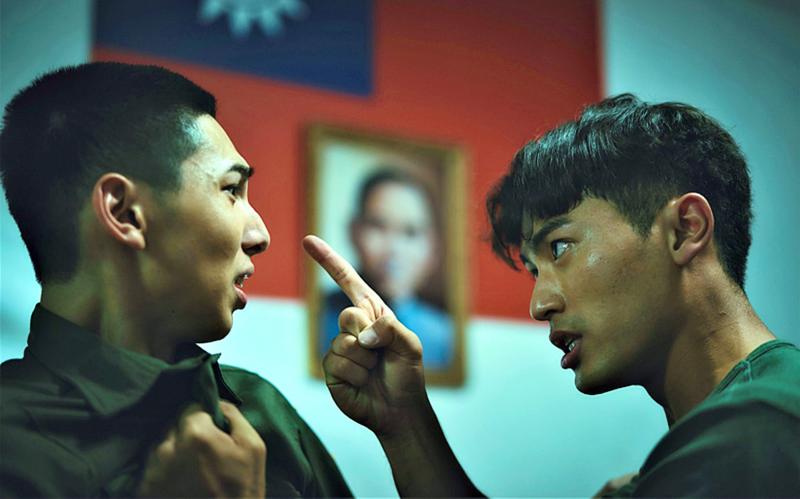It’s hard to know what to expect from a film that takes a popular 1990s “Iron Ox” (鐵牛運功散) herbal remedy television commercial and expands it to 83 minutes. There’s infinite room for imagination, as the commercial basically consists of a young military conscript calling his mother and telling her how effective the remedy is.
“Mom, it’s A-jung!” (媽! 我阿榮啦) he exclaims into the old-school payphone, the catchphrase serving as the Chinese title of Eclipse. He enthusiastically describes the medicine’s benefits, after which his father takes the phone and asks him to come home soon. The ad is still shown on television every now and then, giving rise to the running joke that A-jung is still stuck in military service over 20 years later and still hasn’t returned home.
The film’s version of A-jung (Kai Hsu, 徐愷) also never gets to go home. He’s stuck at the army base, five days away from being discharged, but relives the same day over and over again. It’s March 21, 1996, two days before Taiwan’s first direct presidential elections. A-jung soon learns that even though he’s technically on break, his superiors have forbidden him to go home after finding out that he participated in democracy protests before he joined the army. The base is largely abandoned, and the behavior of the few people there become increasingly bizarre and surreal as A-jung tries to make it out and see his mother.

Photo courtesy of atmovies.com
The world has seen so many successful American stuck-on-the-same-day movies and films, from 1993’s Groundhog Day to last year’s Nextlix drama Russian Doll, that it would be really disappointing if Eclipse turned out to be a poor imitation. It seems so at first, but the story quickly takes on a life of its own with a strong Taiwanese flair.
The result is a smart, dark and highly-relevant mystery thriller that comments on a number of contemporary issues, from bullying in the military to the debate over transitional justice. Due to budget constraints, the film features minimal special effects and uses just a few shooting locations, but the strong plot shows that good storytelling is more important than technical prowess.
The original script by Kao Pu (高普) won an honorable mention for Best Screenplay at the Taipei Film Awards in 2016, a few years after the suspicious death of army corporal Hung Chung-chiu (洪仲丘) sparked widespread protests against military abuse. This behavior has not stopped, as last month’s suicide of a lieutenant over alleged mistreatment by superiors made the headlines. In response, the Ministry of Defense revealed that bullying by officers of their subordinates continues despite prohibitions, with six reported incidents this year as of early last month.
The pacing of the film is brisk, keeping the audience engaged with eerie, suffocating tension as well as A-jung’s growing desperation. The audience solves the mystery with A-jung bit by bit, with just the right amount of information revealed throughout the film.
The painstakingly recreated commercial, with Hsu as the star this time, is aired several times throughout the movie, with the dialogue changing in each iteration to offer further clues. It’s a very creative device that integrates the commercial further into the overall storyline in a meaningful way, and also provides for some light-hearted respite.
Hsu delivers a raw but solid performance in his big screen debut, portraying the bewildered young soldier with emotional intensity that can be too much at times. It would be interesting to see how he does in a more subdued role. Kelvin Chi (紀因澤), who plays a newcomer to the camp, takes the absurd to the next level. His character appears to be just a bit loopy in the beginning, but his behavior gets crazier over the course of the movie. His performance is chilling.
Tuan Chun-hao (段鈞豪) is memorable as the brigade’s chief counselor who repeatedly clashes with Hsu in his attempts to leave the camp, while Candy Yang (楊小黎) also shows her chops as Hsu’s childhood friend who tries to save him — although her appearance and demeanor doesn’t exactly fit her role in the film. She represents the moral dilemma against social injustice — how far would one go to pursue the uncomfortable truth when everyone else just wants to cover things up?
There’s a lot to think about after this film, which pushes the audience toward examining our society and a system that is still broken. It’s impressive that all of this came from just a 45-second commercial, and only with this kind of creativity and willingness to push the envelope while addressing serious issues can Taiwan’s film industry truly shine.